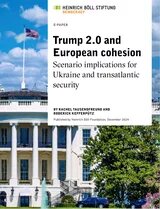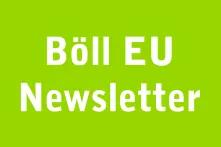Trump is back. And so is his erratic shock and awe style of politics. One day he announces tariffs on Mexico and Canada, the day after he puts them on hold. Who knows what he’ll do next. Europe cannot afford to be paralysed by panic, divided by discord or swept up in performative outrage. Instead of being shocked and awed, the EU must stay calm, adapt and – most importantly – act.

Under Trump, the transatlantic relationship will be more transactional, more volatile, and more demanding. But this is not just about Trump—it is about Europe itself. The EU must work with Washington where interests align, prepare for friction where they don’t, and build its own weight in global affairs.
This is about Europe’s ability to shape events rather than be shaped by them. In this context, here are five guiding lines that can help ensure the EU doesn’t just withstand the Trump era but emerges stronger from it.
1. Stand on two legs: Cooperate and increase own capabilities
Europe must both work with the Trump administration where possible and build its own capabilities where necessary. Transatlantic cooperation remains critical—on Ukraine, Russia, China, and global security – but the EU must also step up as a geopolitical actor. Freeriding under the US security umbrella is no longer an option. This means increasing European defence spending up to 3.5% of GDP and creating the necessary financial instruments on the EU-level to support an increase in European defence. There is increasing momentum for a Recovery and Resilience-style defence fund of several hundred billion euros with cracks in the coalition of frugal EU member states emerging. Germany might still claim there is no prospect for European defence bonds, but that tune might change after the elections.
Defence investments have the potential to do both: strengthen EU-US cooperation and European capabilities. Calls by some actors that an EU defence fund should have a stringent “Buy European” conditionality are – at this point in time – counterproductive. They have the potential to worsen relations with Washington DC and undermine European capabilities. A prime example is the European Commission’s common air defence initiative “Sky Shield”, which requires U.S.-made Patriot missiles. Cooperation and expansion of own capabilities must therefore go hand in hand.
2. Prepare for uncertainty: Build resilience and work with scenarios
Trump means unpredictability. This requires the EU to prepare for potential disruptions, whether they come from trade wars, security shifts, or policy U-turns. As European Commission President Ursula von der Leyen put it: "Be prepared, be very pragmatic, engage and negotiate if necessary." Contingency planning and scenario thinking is crucial under these circumstances. What does Trump’s additional tariff on Chinese goods mean for the EU? Will it ripple through European industry? Which Chinese products are likely to flood European markets as they seek alternative destinations? The EU must map out these vulnerabilities before they become reality.
Security planning must also become more proactive. Trump’s fixation with Greenland should not be dismissed as an erratic obsession. The Arctic is a growing strategic theatre. So what role can Europe play in this regard? Should Thule Air Base be expanded into a NATO asset? Does NATO need a broader Arctic strategy or does the EU’s updated Arctic policy from 2021 require revision and a stronger transatlantic element? The lesson is clear— anticipate, prepare, and engage.
3. Seize the initiative: Look for advantages
Trump’s presidency is undoubtedly a challenge. Nevertheless, that doesn’t mean the EU is just a passive actor, waiting for the latest news to emerge out of Mar-a-Lago. Instead, Brussels needs to look for ways to turn Trump’s political tremors, into an advantage.
If US policies push away top talent, such as scientists, engineers, and tech professionals, could the EU actively recruit them and promote a tech brain gain? Or could Trump be useful when it comes to dealing with EU disruptors, such as Viktor Orbán? Transactionalism cuts both ways. If the US conditions arms sales or economic deals on the EU, Orbán may have less room to undermine European unity. Is it possible to discern any slivers of silver lining, in these stormy clouds, and if so, is the EU bold enough for a strategic move to benefit from them?
4. Fill the void: Strengthen partnerships
Power abhors a vacuum. In geopolitics, there is no empty space—if you don’t occupy it, someone else will. Trump’s America is less predictable and more inward-looking. That leaves a vacuum in global partnerships—one the EU must be ready to fill. The tools are there – ranging from expanding the EU-India Trade and Technology Council (TTC) and advancing EU-India trade relations, to promoting the new EU security and defence partnerships and establishing them with other powers in the world. Trump’s shifting U.S. priorities will leave many countries uncertain about Washington’s commitment. Europe should be a partner that’s ready to step in when the US steps back.
5. Be transactional, but not naïve
As Timothy Garton Ash recently argued, Europe must become more transactional in global politics, a point that both Kaja Kallas and von der Leyen took on board in their speeches to the EU Ambassador’s conference this week. This means negotiating hard, leveraging EU economic power and understanding that for “a Europe that consists entirely of small and medium-sized powers, the only way to generate adequate strength is through coordinated collective action” (Timothy Garton Ash). Trump’s America will be more transactional than ever. Europe must adapt to this reality—but on its own terms.
But here’s the danger: some in Europe may think transactionalism means the EU should play one grand transactional balancing game. For example, between the U.S. and China. This would be a mistake. Trump’s unpredictability does not automatically turn any other country into an ally. It requires the EU to be pragmatic but principled, transactional but anchored in a long-term strategic vision — avoiding both blind Atlanticism and naive equidistance. The EU must not stoop down to the level of a geopolitical swinger, unpredictably shifting from one power to the other – one day banding with this country, the next with someone else.
The test of European unity
A senior EU ambassador once remarked: "We are all united—until we are tested." Trump’s return to power is precisely that – a test. The EU must remain united, act strategically, and seize the moment as best possible. The task ahead is clear: cooperate where possible, push back where necessary, and invest in European strength regardless.
This article is based on a presentation on EU-US relations under a second Trump administration, delivered to a group of Members of the German Bundestag in January 2025.
The views and opinions in this article do not necessarily reflect those of the Heinrich-Böll-Stiftung e.V.


